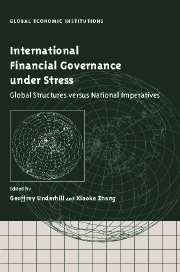Book contents
- Frontmatter
- Contents
- List of figures
- List of tables
- List of contributors
- Acknowledgements
- Introduction: global market integration, financial crises and policy imperatives
- I Financial globalisation and policy responses: concepts and arguments
- II Globalisation, financial crises and national experiences
- 5 Crisis consequences: lessons from Thailand
- 6 The politics of financial reform: recapitalising Indonesia's banks
- 7 South Korea and the Asian crisis: the impact of the democratic deficit and OECD accession
- 8 Currency crises in Russia and other transition economies
- 9 Capital account convertibility and the national interest: has India got it right?
- 10 Learning to live without the Plan: financial reform in China
- 11 The Asian financial crisis and Japanese policy reactions
- III Private interests, private–public interactions and financial policy
- IV Building the new financial architecture: norms, institutions and governance
- Conclusion: towards the good governance of the international financial system
- Index
6 - The politics of financial reform: recapitalising Indonesia's banks
Published online by Cambridge University Press: 22 September 2009
- Frontmatter
- Contents
- List of figures
- List of tables
- List of contributors
- Acknowledgements
- Introduction: global market integration, financial crises and policy imperatives
- I Financial globalisation and policy responses: concepts and arguments
- II Globalisation, financial crises and national experiences
- 5 Crisis consequences: lessons from Thailand
- 6 The politics of financial reform: recapitalising Indonesia's banks
- 7 South Korea and the Asian crisis: the impact of the democratic deficit and OECD accession
- 8 Currency crises in Russia and other transition economies
- 9 Capital account convertibility and the national interest: has India got it right?
- 10 Learning to live without the Plan: financial reform in China
- 11 The Asian financial crisis and Japanese policy reactions
- III Private interests, private–public interactions and financial policy
- IV Building the new financial architecture: norms, institutions and governance
- Conclusion: towards the good governance of the international financial system
- Index
Summary
Before Asia's financial crisis there was general agreement within the broad neo-liberal camp that deregulation, not least in the financial sector, was the key ingredient of effective market reform. Western governments, their aid agencies and international financial institutions, notably the IMF and the World Bank, enthusiastically pressed for the opening of capital markets and the removal of state control and ownership in domestic financial and banking sectors. But the crisis was to change all that, setting in train a bitter debate over whether these reforms had, ironically, been at the heart of the crisis.
For hardline neo-classical economists within the IMF and elements of the economic press, the crisis was confirmation that economies built around systems of state-managed markets were not sustainable in the long term. For these hardliners, the Asian economies that collapsed in 1997 fell under the weight of their own inherent inefficiency and dysfunction. The crisis was a reminder that deregulation had not gone far enough and that economies must embrace the natural efficiencies of the market.
Others within the neo-liberal camp were, however, to propose that the roots of the crisis were to be explained in terms of panic and speculation in open global financial markets and an ensuing rush for the exits when confidence collapsed. Such interpretations led naturally to policy prescriptions centring on reform in global financial architecture rather than a reconstruction of domestic economic and political regimes.
- Type
- Chapter
- Information
- International Financial Governance under StressGlobal Structures versus National Imperatives, pp. 119 - 139Publisher: Cambridge University PressPrint publication year: 2003



